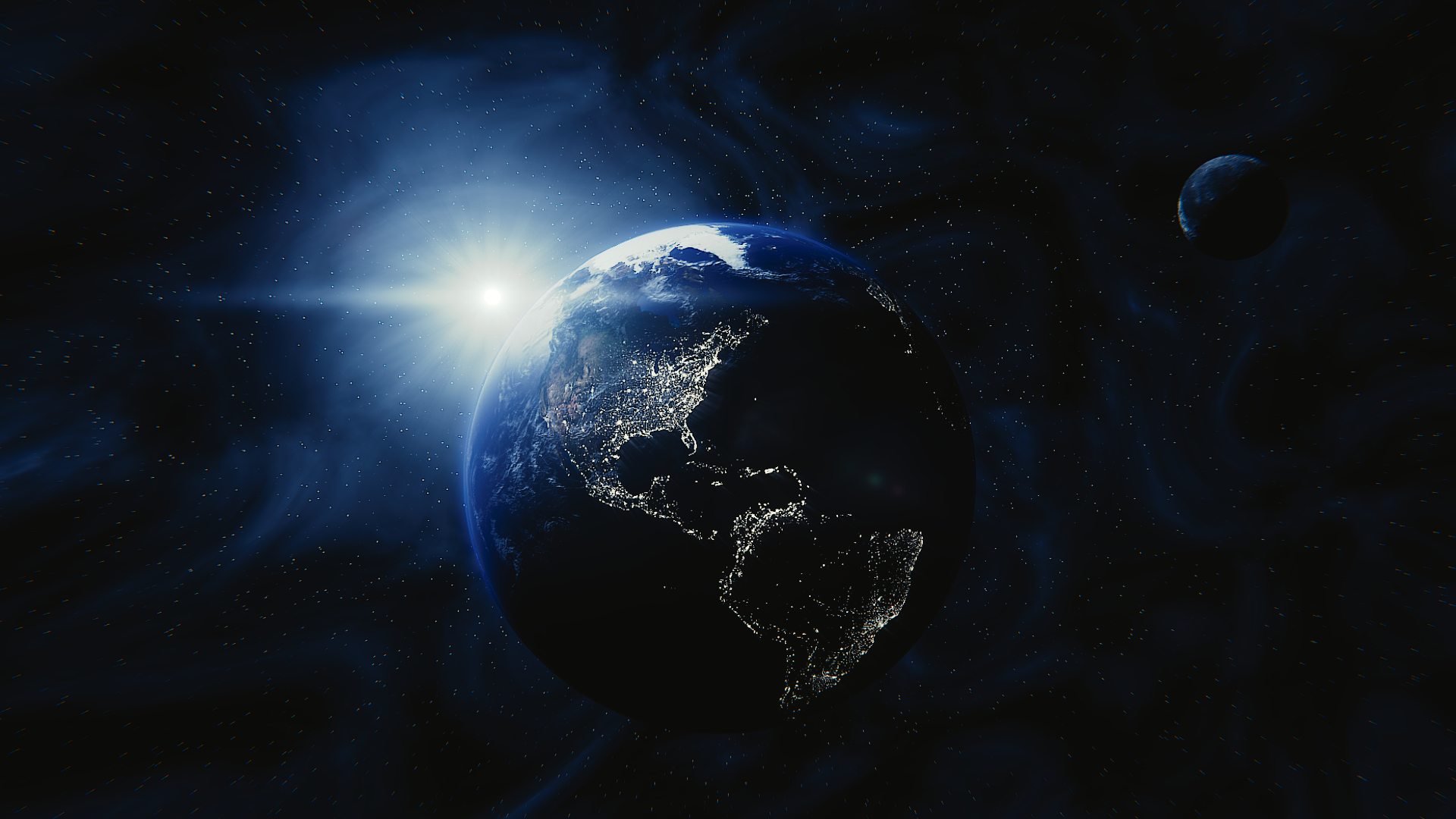
Articles on the Anthropocene
In-depth articles on the Anthropocene
What future for the Anthropocene? - The Great Decoupling, the Great Collapse or Degrowth... among many other possibilities
Towards a crossbreeding scenario between decoupling and collapse?
This is the concluding part of the previous three articles, each of which detailed an Anthropocene evolution scenario for the coming years, with 1) the Great Decoupling, 2) the Great Collapse and 3) Degrowth.
Three particularly contrasting scenarios in terms of philosophy and implications (social, political, ecological...). So, which is the most likely scenario? Does the realization of one scenario necessarily exclude the realization of another?
The three trajectories of the Anthropocene future in brief
Let's begin by summarizing the main points of the three scenarios previously developed:
Scenario 1 – The Great Decoupling: The goal of human activity remains the growth of production-consumption, i.e. Gross Domestic Product (GDP), with the ambition of "decoupling" this growth from environmental degradation. Radical transformations in our modes of production and consumption, with a healthy dose of innovation and technology, lead to a break in the historical link (the decoupling, in other words) between GDP growth and environmental deterioration. We can then produce and consume ever more, which should guarantee the well-being of as many people as possible.
Scenario 2 – The Great Collapse: The decoupling does not go as smoothly as expected, to the point where we enter into a logic of sudden and uncontrolled decline in human activity as measured by GDP (and ultimately population). Climate change, reduced availability of natural resources and the fracturing of society (due in particular to inequalities) are three possible major causes of the Great Collapse.
Scenario 3 – Degrowth: A majority of the population opts for a transitional, equitable and voluntary reduction in activity as measured by GDP, in order to achieve a new "stationary" or "post-growth" economy, in balance with ecological limits and freed from the growth imperative. This radical bifurcation requires us to stop believing in growth as the sole guarantee of well-being for all (cultural revolution), and a total reorganization of society to ensure a more balanced distribution of wealth in a context of economic downsizing (social revolution).
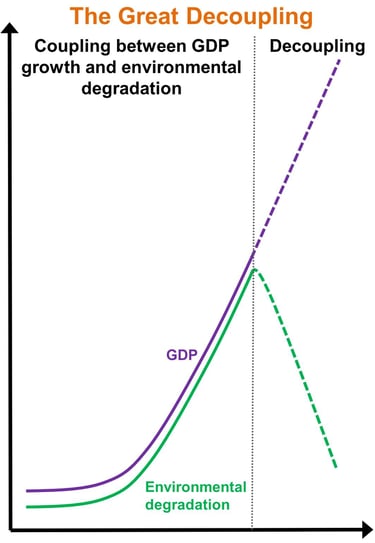

Figure 1: Conceptual representations of the three scenarios from the point of view of the relationship between human activity as measured by GDP and environmental alteration, with, from left to right, the Great Decoupling, the Great Collapse and Degrowth.
My feelings on these different scenarios are already evident from my previous writings and can be summed up in these few words: the Great Decoupling disgusts me, the Great Collapse frightens me and Degrowth attracts me. But beyond this personal assessment, let's now try to evaluate and compare the plausibility of each scenario.
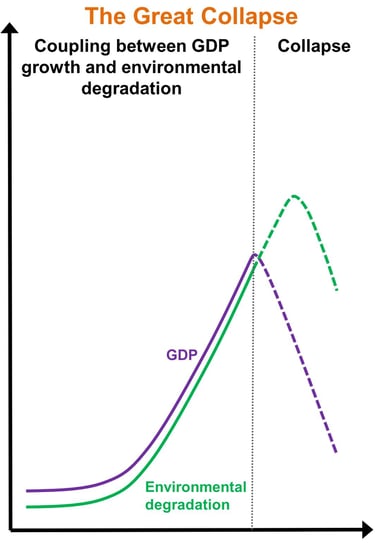

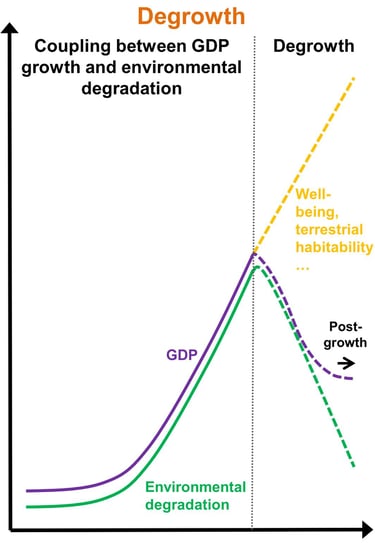

Degrowth: disqualified even before the start
Today, there is an extraordinary inconsistency between the support for the concept of degrowth expressed by a significant proportion of the population in various opinion polls [1, 2] and the ridiculously low scores of degrowth-based projects in democratic consultations [3, 4]. Generally speaking, degrowth remains a concept not debated, but opposed by the vast majority of politicians, economists, business leaders, journalists and other "world leaders" [5, 6, 7].
From these observations, we can deduce that degrowth remains an idea that acts like a scarecrow, and for which most of us, even if some consider it of potential interest, are in no way ready to take the plunge and put it into practice. There's therefore every chance that it will remain a dead letter, and only a fool would bet on such a scenario becoming a reality in the near future, even on a national scale. So we're left to decide between the Great Decoupling and the Great Collapse.
The great decoupling: a determined underdog but an implausible winner
Like Degrowth, the Great Decoupling is a scenario whose realization presupposes that we voluntarily take an active part in it. And in the case of the Great Decoupling, unlike Degrowth, there's no lack of willpower! Indeed, this scenario is endorsed by all of today's "leaders", from the most "high-profile" politicians to megalomaniac entrepreneurs like Elon Musk or Jeff Bezos [8, 9]. For some years or decades now, ambitious policies have been implemented to make it a reality.
However, the will is sometimes not enough and, for various reasons, the Great Decoupling is not a very credible scenario. Recent analyses show that, despite the aforementioned efforts, decoupling is not fast enough, is only partial (it only concerns certain aspects of environmental alteration), local (it is not expressed globally) and relative (for example, there is no absolute decoupling between CO2 emissions and GDP, since even if the former increases less quickly than the latter, both continue to rise) [10, 11]. Taken all together, it seems that the Great Decoupling is not around the corner. Which leaves the Great Collapse as the only candidate for final victory?
The great collapse: a dreaded contender for final victory
Before declaring it the winner, it's worth noting that the Great Collapse has gained in credibility in recent years, between the media success of "collapsologists" [12] and the very real collapse of certain primordial aspects of our world. Ecological collapse in particular is a well-documented reality, as evidenced by the sudden collapse of animal populations [13] and the acceleration of species extinction [14].
The collapse of civilization itself, however, is more theoretical at this stage. The feeling that "it could happen" is alive and well in the population, as many people confide in opinion polls [15, 16]. This feeling is, of course, fuelled by the aforementioned ecological collapse and the prospects of climate change, as well as by rising social and geopolitical tensions, to which increasing inequality and the stubborn (or moronic) ambition of infinite growth, by its very nature impossible and therefore a source of frustration, are probably no strangers.
Verdict
The table below summarizes the main points of what we have seen in this article on the future of the Anthropocene:
Ultimately, among the three scenarios presented, it is rather the Great Collapse that has the wind in its sails, and it is not the current events (extreme climatic events, increasing geopolitical tensions, multiplication of wars, etc.) that will change the situation. If we had to choose a single scenario among the three, it is certainly on the Great Vollapse that a rational mind would turn. But should we stick to a single scenario that is, after all, rather caricatured? Knowing that an infinite number of intermediaries between the three scenarios presented are possible, should we not rather bet on a mixed scenario?
The victory of crossbreeding between decoupling and collapse?
As we have seen, degrowth is very unlikely, even on a local scale. If there is to be a mix of scenarios, it would rather be between the Great Decoupling and the Great Collapse. In fact, this mix is perhaps the most credible scenario, because it is precisely what is happening right now!
Even if we are a thousand miles away from a Great Decoupling, there are already partial decouplings (for example, the relative decoupling between GDP growth and CO2 emissions) or localized decouplings (for example, the decoupling between population growth and the loss of forest cover in France). In parallel with these timid beginnings of decoupling, collapses are observed at the level of certain ecological indicators (collapse of animal populations or disappearance of species), without us having yet entered into a logic of Great Collapse.
We can imagine that this decoupling/collapse duality will continue for a while longer. It is not impossible that we will eventually succeed in further decoupling economic activity and CO2 emissions, in particular through the electrification of many economic processes, but that at the same time the collapse of animal populations will continue, the latter having so far had very little to do with CO2 emissions and climate change [17].
Some decouplings could even promote certain collapses, with the electrification necessary for the decarbonization of the economy, for example, leading to a shift in ecological pressures likely to aggravate certain damage to the biosphere (less CO2 emitted, but greater degradation linked to the extraction of the countless metals necessary for electrification).
The decoupling/collapse duality can also be expressed in space, with decoupling in some countries going hand in hand with a logic of collapse in other countries. To take the example of electrification, so-called "developed" countries are today plundering the metal resources of other countries to make their "transition". In Congo, this rush for metals has a terrible human and ecological cost, fueling social instability, armed conflicts and pollution [18, 19, 20, 21]. This example illustrates the possibility of a local and relative decoupling (between GDP growth and CO2 emissions in some countries) at the cost of a collapse in some countries.
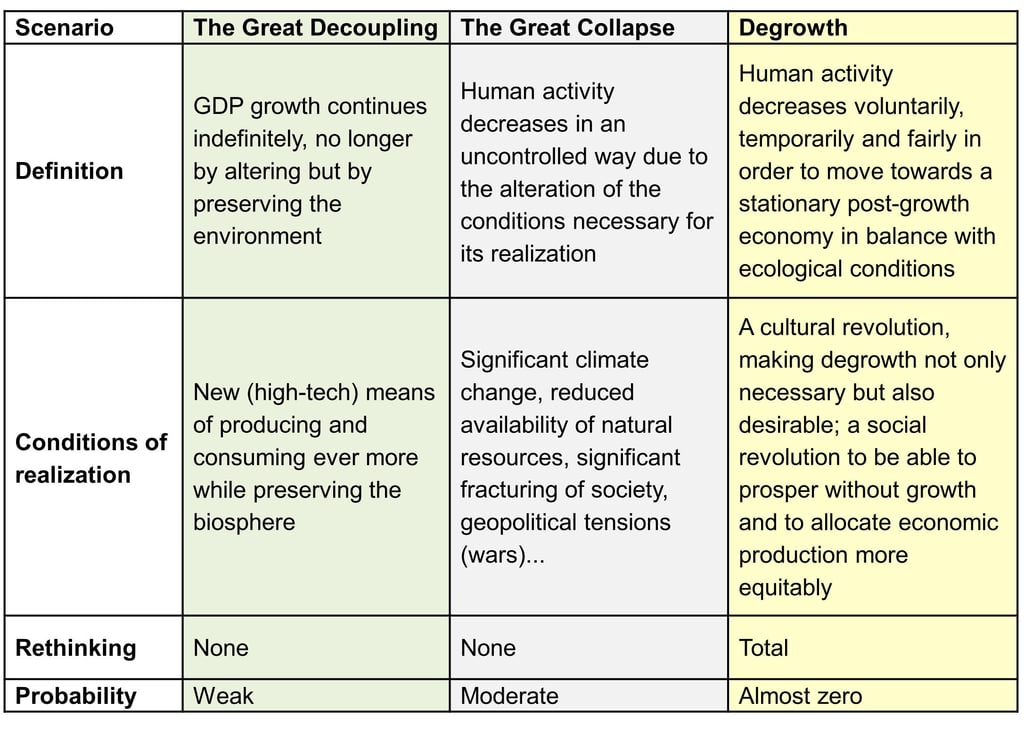

References
[1] Odoxa, « Les Français, plus « écolos » que jamais », Odoxa. 2019. https://www.odoxa.fr/sondage/barometre-economique-doctobre-francais-plus-ecolos-jamais/
[2] Odoxa-MEDEF, « Le rapport au progrès : Regard des Français et comparatif européen (sens, valeur, adhésion, partage et diffusion) ». 2020. https://www.medef.com/uploads/media/default/0019/96/13294-progres-synthese-actualisee-post-covid-sondage-medef.pdf
[3] Ministère de l’Intérieur, « Publication des candidatures et des résultats aux élections - Législatives 2024 ». 2024. https://www.archives-resultats-elections.interieur.gouv.fr/resultats/legislatives2024/ensemble_geographique/44/88/8802/index.php
[4] « Législatives 2024 : Résultats et Communiqués », Décroissance Elections. https://www.decroissance-elections.fr/legislatives-2024-resultats-et-communiques
[5] Le Figaro, «La décroissance n’est pas une réponse au défi climatique», explique Emmanuel Macron, (2020). https://www.youtube.com/watch?v=tVH04X2gSAc
[6] N. Bouzou, « Misère de la décroissance », L’Express. 2020. https://www.lexpress.fr/economie/nicolas-bouzou-misere-de-la-decroissance_2125127.html
[7] L. Ferry, « Pourquoi la décroissance serait catastrophique », Le Figaro. 2021. https://www.lefigaro.fr/vox/societe/luc-ferry-pourquoi-la-decroissance-serait-catastrophique-20211215
[8] A. Piquard, « Jeff Bezos rêve d’envoyer l’humanité dans l’espace », Le Monde. 2021. https://www.lemonde.fr/economie/article/2021/06/11/jeff-bezos-reve-d-envoyer-l-humanite-dans-l-espace_6083678_3234.html
[9] O. Milman, « Elon Musk was once an environmental hero: is he still a rare green billionaire? », The Guardian. 2023. https://www.theguardian.com/environment/2023/nov/20/elon-musk-green-credentials-clean-energy-climate-deniers
[10] H. Haberl et al., « A systematic review of the evidence on decoupling of GDP, resource use and GHG emissions, part II: synthesizing the insights », Environ. Res. Lett., vol. 15, no 6, p. 065003, 2020. https://iopscience.iop.org/article/10.1088/1748-9326/ab842a
[11] T. Parrique et al., « Decoupling debunked: Evidence and arguments against green growth as a sole strategy for sustainability. European Environmental Bureau. », 2019. https://eeb.org/library/decoupling-debunked/
[12] P. Servigne et R. Stevens, Comment tout peut s’effondrer. Petit manuel de collapsologie à l’usage des générations présentes. Seuil, 2015.
[13] G. Ceballos, P. R. Ehrlich, et P. H. Raven, « Vertebrates on the brink as indicators of biological annihilation and the sixth mass extinction », Proc. Natl. Acad. Sci., 2020. https://www.pnas.org/doi/full/10.1073/pnas.1922686117
[14] G. Ceballos, P. R. Ehrlich, A. D. Barnosky, A. García, R. M. Pringle, et T. M. Palmer, « Accelerated modern human–induced species losses: Entering the sixth mass extinction », Sci. Adv., vol. 1, no 5, p. e1400253, 2015.
[15] IFOP, « Enquête internationale sur la « collapsologie » - Sondage Ifop pour la Fondation Jean Jaurès », Fondation Jean-Jaurès. https://www.jean-jaures.org/wp-content/uploads/drupal_fjj/redac/commun/productions/2020/1002/enquete_collapso.pdf
[16] G. Rozières et M. Balu, « 6 Français sur 10 redoutent un effondrement de notre civilisation », Le HuffPost. 2019. https://www.huffingtonpost.fr/c-est-demain/video/6-francais-sur-10-redoutent-un-effondrement-de-notre-civilisation-sondage-exclusif_156101.html
[17] WWF, « Living Planet Report − 2022: Building a nature-positive society », WWF, Gland, Suisse, 2022. https://wwfint.awsassets.panda.org/downloads/embargo_13_10_2022_lpr_2022_full_report_single_page_1.pdf
[18] C. Pierret, « Les richesses minières de la République démocratique du Congo suscitent l’avidité des puissances locales et globales », 2024. https://www.lemonde.fr/economie/article/2024/06/12/les-richesses-minieres-de-la-republique-democratique-du-congo-suscitent-l-avidite-des-puissances-locales-et-globales_6239058_3234.html
[19] Amnesty International, « Alimenter le changement ou le statu quo ? », Amnesty International. 2023. https://www.amnesty.org/fr/latest/news/2023/09/drc-cobalt-and-copper-mining-for-batteries-leading-to-human-rights-abuses/
[20] La Décroissance, « L’ogre numérique mange la terre et ravage le Congo - Entrevue avec Fabien Lebrun », La Décroissance vol. 213, p. 12, 2024.
[21] France Inter, « La guerre des métaux au Congo », France Inter, 2024. https://www.radiofrance.fr/franceinter/podcasts/la-terre-au-carre/la-terre-au-carre-du-mercredi-11-decembre-2024-8712105
[22] N. N. Taleb, Le cygne noir - La puissance de l’imprévisible. Les Belles Lettres, 2020.
Conclusion
If it is possible to draw up great scenarios of future evolution, it would be very clever to say what will happen to the Anthropocene! There are an infinite number of possibilities for our future and we must sometimes be humble and recognize that we do not know.
Far from a linear evolution, history seems rather to be punctuated by brutal and totally unpredictable events (black swans [22]), which caused stupor and astonishment when they occurred. This is the work of historians, by subsequently reconstructing logical narratives with well-established causalities, which gives the illusion of a history that is a priori predictable, when in fact it is essentially only reconstructable a posteriori.
Since no one knows what will happen, the objective here was therefore not to predict the future, but to describe some major possibilities of evolution and their implications; a reflection that can be useful in knowing where we want to go. Because while we can't predict the future, we can certainly influence tomorrow's events to some extent through the choices we make today.
Henri Cuny
